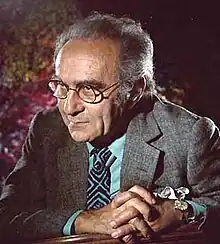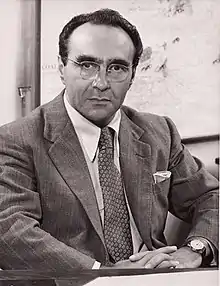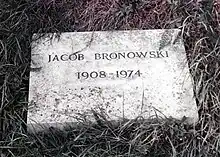Jacob Bronowski
Jacob Bronowski (18 January 1908 – 22 August 1974) was a Polish-British mathematician and philosopher. He was known to friends and professional colleagues alike by the nickname Bruno. He is best known for developing a humanistic approach to science, and as the presenter and writer of the thirteen-part 1973 BBC television documentary series, and accompanying book The Ascent of Man. This endeavour propelled him into the esteemed position of being widely regarded as "one of the most revered intellectuals on the global stage."[1]
Jacob Bronowski | |
|---|---|
 | |
| Born | 18 January 1908 |
| Died | 22 August 1974 (aged 66) East Hampton, New York, U.S. |
| Resting place | Highgate Cemetery, London, England |
| Nationality | British |
| Alma mater | Jesus College, Cambridge |
| Known for | The Ascent of Man |
| Spouse |
Rita Coblentz (m. 1941) |
| Children | 4, including Lisa Jardine |
| Awards | Senior wrangler (Cambridge) |
| Scientific career | |
| Fields | Mathematics, operations research, biology, history of science, geometry |
| Institutions | Salk Institute |
| Doctoral advisor | H. F. Baker |
Bronowski's family moved from Congress Poland to Germany and then to England while he was a child. He won a scholarship to study mathematics at the University of Cambridge. His interests have been described as ranging "widely, from biology to poetry and from chess to Humanism".[2] He taught mathematics at University College Hull between 1934 and 1942. During World War II he led the field of operations research and worked to increase the effectiveness of Allied bombing. After the war he headed the projects division of UNESCO. Bronowski wrote poetry and had a deep affinity for William Blake. From 1950 to 1963 he worked for the National Coal Board in the UK. From 1963 he was a resident fellow of the Salk Institute for Biological Studies in San Diego, until his death in 1974 in East Hampton, New York, just a year after the airing of his Ascent of Man.
Early life and education
Jacob Bronowski was born to a Polish-Jewish family in Łódź, Congress Poland, in 1908. His family moved to Germany during the First World War, and to Britain in 1920, Bronowski's parents having been married in Britain in the London house of his maternal grandfather in 1907. Although, according to Bronowski, he knew only two English words on arriving in Britain,[3] he gained admission to the Central Foundation Boys' School in London and went on to study mathematics at the University of Cambridge, graduating as Senior Wrangler (best student mathematician) in 1930.[4]
As a mathematics student at Jesus College, Cambridge, Bronowski co-edited – with William Empson – the literary periodical Experiment, which first appeared in 1928. Bronowski would pursue this sort of dual activity, in both the mathematical and literary worlds, throughout his professional life. He was also a strong chess player, earning a half-blue while at Cambridge and composing numerous chess problems for the British Chess Magazine between 1926 and 1970.[5] He received a PhD in mathematics at Cambridge in 1935, writing a dissertation in algebraic geometry. For a time in the 1930s he lived near Laura Riding and Robert Graves in Majorca. From 1934 to 1942, he taught mathematics at the University College of Hull. Beginning in this period, the British secret service MI5 placed him under surveillance, believing he was a security risk, which may have restricted his access to senior posts in the UK.[6]
Wartime work in military analysis

During the Second World War, Bronowski worked in operations research for the UK's Ministry of Home Security, where he developed mathematical approaches to bombing strategy for RAF Bomber Command.
At the end of the war, Bronowski was part of a British team of scientists and civil engineers who visited Japan to document the effects of the atomic bombings of Hiroshima and Nagasaki for the purpose of studying the effects of the atomic bomb and its implications for future UK civil defence. Bronowski, in conjunction with Professor W. N. Thomas of Cardiff University,[7] subsequently produced the secret Report of the British Mission to Japan: the Effects of the Atomic Bombs Dropped at Hiroshima and Nagasaki,[8] which was passed to various government departments and consulted in the design of future UK public buildings. It was simultaneously published in the US.
Post-war biological analysis
Following his experiences of the after-effects of the Nagasaki and Hiroshima bombings, he discontinued his work for British military research and turned to biology, as did his friend Leo Szilard, and many other physicists of that time, to better understand the nature of violence. Subsequently, Bronowski became Director of Research for the National Coal Board in the UK, and an associate director of the Salk Institute from 1964.
In 1950, Bronowski was given the Taung Child's fossilised skull and asked to try, using his statistical skills, to combine a measure of the size of the skull's teeth with their shape in order to discriminate them from the teeth of apes.[9] Work on this turned his interests towards the biology of humanity's intellectual products.
Public science education
In 1967 Bronowski delivered the six Silliman Memorial Lectures at Yale University and chose as his subject the role of imagination and symbolic language in the progress of scientific knowledge. Transcripts of the lectures were published posthumously in 1978 as The Origins of Knowledge and Imagination and remain in print. He first became familiar to the British public through appearances on the BBC television version of The Brains Trust in the late 1950s.
Bronowski is best remembered for his 13-part series The Ascent of Man (1973), a BBC television documentary about the history of human life and scientific endeavour. This project was commissioned by David Attenborough, then Head of BBC2, and was intended to complement two preceding series: art historian Kenneth Clark's "personal view" series Civilisation (1969), which had covered cultural history, and Alistair Cooke's series America: A Personal History of the United States (first broadcast in 1972).
Following the making of The Ascent of Man, Bronowski was interviewed on the chat show Parkinson. Host Michael Parkinson later recounted that Bronowski's description of his visit to Auschwitz, where many Polish members of his family died during the Holocaust, was one of the most memorable parts of any interview he had done.[10] After he had completed the last episode of his show, Parkinson stated: "If I could save one interview from the thousands I have done, it would be the one-man show with Professor Jacob Bronowski."[11]
Personal life
Bronowski married Rita Coblentz in 1941.[12] The couple had four daughters, the eldest being the academic Lisa Jardine and another being the filmmaker Judith Bronowski.
He spent time interviewing the physicist Leo Szilard for about the last year of the scientist's life. Szilard, who died in mid-1964, had authored the 1939 letter to Franklin D. Roosevelt arguing in favour of pursuing nuclear weapons to ensure victory over the Nazis.[13]
Bronowski died in 1974 of a heart attack in East Hampton, New York,[14] a year after The Ascent of Man was first televised, and his ashes were buried in the western side of London's Highgate Cemetery, near the entrance. Rita died in California in September 2010, aged 92.[12] The ashes of Lisa Jardine, who died in 2015,[15] were buried on 25 October 2016 next to her father's in Highgate Cemetery.
Books

- The Poet's Defence (1939)
- William Blake: A Man Without a Mask (1943)
- The Common Sense of Science (1951)
- The Face of Violence (1954)
- Science and Human Values. New York: Julian Messner, Inc. 1965 [1956].
- William Blake: The Penguin Poets Series (1958)
- The Western Intellectual Tradition, From Leonardo to Hegel (1960) – with Bruce Mazlish
- Biography of an Atom (1963) – with Millicent Selsam
- Insight (1964)
- The Identity of Man. Garden City: The Natural History Press. 1965.
- Nature and Knowledge: The Philosophy of Contemporary Science (1969)
- Atomic Fusion, illustrated by Bartley Powell. Published by Newman Neame Take Home Books Ltd.
- William Blake and the Age of Revolution (1972)
- The Ascent of Man (1974)
- A Sense of the Future (1977)
- Magic, Science & Civilisation (1978)
- The Origins of Knowledge and Imagination (1978)
- The Visionary Eye: Essays in the Arts, Literature and Science (1979) – edited by Piero Ariotti and Rita Bronowski.
References
- Radford, Tim (15 April 2011). "The Ascent of Man by Jacob Bronowski - review". The Guardian. Retrieved 29 September 2018.
- "Jacob Bronowski (1908-1974)". humanistheritage.org.uk. Retrieved 29 September 2018.
- Bronowski, Jacob (1967). The Common Sense of Science. Cambridge, Massachusetts: Harvard University Press. p. 8. ISBN 978-0-674-14651-8.
- "Profile – Dr Jacob Bronowski | His greatest delight: to share his thoughts". New Scientist. No. 262. 23 November 1961. p. 483.
- Winter, Edward. "Chess Notes". Retrieved 23 March 2008.
- Berg, Sanchia (4 April 2011). "MI5 'said Bronowski was a risk'". BBC News.
- "Obituary: Professor William Norman Thomas CBE, MA, PhD". Proceedings of the Institution of Civil Engineers. 22 (2): 249–50. June 1962. doi:10.1680/iicep.1962.11092.
- Thomas, W. N.; Bronowski, Jacob; et al. (c. 1946). The Effects of the Atomic Bombs Dropped at Hiroshima and Nagasaki: Report of the British Mission to Japan (PDF). Publication No. NP-1156. Tennessee: US Atomic Energy Commission. NB! This file has no identifying file extension: you will need to save it as
4430289.pdfin order to open it in a pdf reader. - Swetz, Frank J. (March 1985). "Mathematics: A Vehicle for Better Global Understanding". The Mathematics Teacher. 78 (3): 207–215. doi:10.5951/MT.78.3.0207. JSTOR 27964452.
- Bronowski, Jacob (8 February 1974). "Dr. Jacob Bronowski". Parkinson (Interview). Interviewed by Michael Parkinson. BBC Television. Retrieved 3 February 2014.
- Parkinson, Michael (2010), Parky's People. Hodder & Stoughton.
- Jardine, Lisa (22 September 2010). "Obituary: Rita Bronowski". The Guardian.
- Bronowski, J. (1988). "Knowledge or Certainty". ETC: A Review of General Semantics. 45 (1): 43–51. ISSN 0014-164X. JSTOR 42579414.
- "Milestones, Sep. 2, 1974", Time website (n.d., reprint of contemporary item)
- Kennedy, Helena; Eleanor Updale (26 October 2015). "Lisa Jardine obituary". The Guardian.
External links
- Jacob Bronowski at the Mathematics Genealogy Project
- O'Connor, John J.; Robertson, Edmund F., "Jacob Bronowski", MacTutor History of Mathematics Archive, University of St Andrews (includes biography, pictures and obituary).
- The Jacob Bronowski Archive
- The Bronowski Trophy (chess)
- Hicks, Stephen R. C. (13 November 2019). "The Ascent of Jacob Bronowski: The Life and Ideas of a Popular Science Icon by Timothy Sandefur (Review)". The Objective Standard.